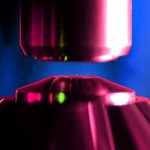
Control of Motional Quantum States for Levitated Particles
Project focus
- Feedback cooling of levitated nanoparticles into its quantum ground state
- Generation of more evolved motional quantum states, e.g., quantum squeezed states and non-gaussian states
- High-performance real-time control using FPGAs
- Shaping of optical trapping potentials
- Quantum-enhanced sensing applications
Description
Over the past decade, great progress in the engineering of optomechanical platforms has pushed nano- and micro-meter-sized objects into the realm where quantum effects start to manifest themselves. Recently, platforms based on the optical levitation of particles have emerged that offer superior isolation from their environment while benefitting from the flexibility and tunability of all-optical manipulation. These experiments combine established methods from optomechanics with strategies from atomic physics, matterwave interferometry, and control theory to explore macroscopic quantum physics. Along with their unrivaled sensitivity, levitated nanoparticles hold promises ranging from commercial sensing applications to the search for new physics.
In this research project, we aim to utilize methods from control theory to develop real-time-capable control algorithms in order to generate motional quantum states of the levitated particle. To this end, cooling the center-of-mass of the particle through measurement feedback is a crucial first step, which is possible by combining Heisenberg-limited measurements with optimal stochastic control concepts. This opens the door to more envolved quantum states such as squeezed states, which provide opportunities with respect to quantum-enhanced sensing applications as well as coherent state expansion, and ultimately non-gaussian states by letting the particle evolve in a nonlinear potential.
Selected publications
- L. Magrini, P. Rosenzweig, C. Bach, A. Deutschmann-Olek, S. G. Hofer, S. Hong, N. Kiesel, A. Kugi, and M. Aspelmeyer, Real-time optimal quantum control of mechanical motion at room temperature, Nature, vol. 595, p. 373–377, 2021.
[BibTex] [Download]@Article{magrini2021, author = {L. Magrini and P. Rosenzweig and C. Bach and A. {Deutschmann-Olek} and S. G. Hofer and S. Hong and N. Kiesel and A. Kugi and M. Aspelmeyer}, title = {Real-time optimal quantum control of mechanical motion at room temperature}, doi = {10.1038/s41586-021-03602-3}, pages = {373--377}, volume = {595}, journal = {Nature}, year = {2021}, }
Partners
Funding
This project is funded by the Austrian Science Fund [PAT 9140723] and the European Union – NextGenerationEU.

